Sigma Xi Distinguished Lecturers, 2007-2008
Abstracts
Each lecturer has designated his or her topic(s) for three different types of audiences. Where more than one level is shown, the lecture can be adjusted to the needs of the audience:
- P (Public)
Aimed at presenting scientific issues of general concern to a public audience.
- G (General)
Intended for a normal Sigma Xi audience of both scientists and other scholars representing a broad range of disciplines.
- S (Specialized)
Aimed at scientists and students in fields that are closely related to that of the lecturer.
Helen M. Berman
Board of Governors, Professor of Chemistry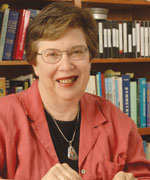 and Chemical Biology
and Chemical Biology
Rutgers, The State University of New Jersey
RCSB Protein Data Bank
Doolittle Hall, 610 Taylor Road
Rutgers, The State University of New Jersey
Piscataway, NJ 08854
Phone: 732-445-4667
E-mail: berman@rcsb.rutgers.edu
Helen M. Berman is a Board of Governors Professor of Chemistry and Chemical Biology at Rutgers University. Her research area is structural biology and bioinformatics, with a special focus on protein-nucleic acid interactions. She is the founder of the Nucleic Acid Database, a repository of information about the structures of nucleic acid-containing molecules; and is the co-founder and Director of the Protein Data Bank, the international repository of the structures of biological macromolecules. She is a Fellow of the American Association for the Advancement of Science and of the Biophysical Society, from which she received the Distinguished Service Award in 2000. A past president of the American Crystallographic Association, she is a recipient of the Buerger Award (2006). Dr. Berman received her A.B. in 1964 from Barnard College and a Ph.D. in 1967 from the University of Pittsburgh.
National Academy of Science Lecturer in Sustainable Economic Development
John B. Carberry
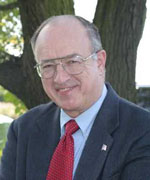 Director, Environmental Technology
Director, Environmental Technology
E.I. DuPont
Experimental Station
E302/208
E.I. DuPont
Wilmington, DE 19880-0302
Phone: 302-695-3304
E-mail: john.b.carberry@usa.dupont.com
John B. Carberry is responsible for recommendations on technical programs and product development for DuPont based on an analysis of environmental issues. Since 1989, he has led this technology function in a transition to increasingly emphasize waste prevention, product stewardship and sustainability while maintaining excellence in treatment. Externally, Mr. Carberry serves on the National Academy Committee on Strategic Advice to the U.S. Climate Change Science Program and the Academy's Roundtable on Science and Technology for Sustainability. Mr. Carberry is a founding member of the Green Power Market Development Group. He recently was Chair of the National Academy Committee on the Destruction of the Non-Stockpile Chemical Weapons, and served on six previous National Academy Committees. He holds a B.ChE. and an M.E. in Chemical Engineering from Cornell University, an MBA from the University of Delaware and is a Registered Professional Engineer.
Mr. Carberry lives in Newark DE with his wife Sandra. They have two married children and four grandchildren.
Daryl E. Chubin
Center Director
American Association for the Advancement of Science
Center for Advancing Science & Engineering Capacity
1200 New York Ave, NW
Washington, DC 20005
Phone: 202-326-6785
E-mail: dchubin@aaas.org
Web: www.aaascapacity.org
Daryl E. Chubin has had three careers: academic, federal, and nonprofit. He became Founding Director, in August 2004, of the AAAS Center for Advancing Science & Engineering Capacity (www.aaascapacity.org) at the American Association for the Advancement of Science in Washington, DC. Prior to that, he was Senior Vice President, Research, Policy & Programs (2001-04) at the National Action Council for Minorities in Engineering (NACME) Inc., in White Plains, New York, after nearly 15 years in federal service. Posts included Senior Policy Officer for the National Science Board at the National Science Foundation (NSF, 1998-2001); Division Director for Research, Evaluation and Communication in NSF's Directorate for Education and Human Resources (1993-98); and (on detail) Assistant Director for Social and Behavioral Sciences (and Education) at the White House Office of Science and Technology Policy (1997). He began his federal career at the congressional Office of Technology Assessment (1986-93), directing studies on science education and federal research funding policy.
In his first career, Dr. Chubin was a faculty member at four universities, including Georgia Tech, where he was promoted to full professor. Since 1991, he has been Adjunct Professor at the Cornell in Washington Program. He has published eight books and numerous policy reports, articles, and commentaries on issues in science policy, human resource development, program evaluation, and engineering education.
Chubin serves on the editorial boards of three journals and as a director on nonprofit Boards. Among his honors are: AAAS Fellow, Past Chair of the AAAS section on Societal Impacts of Science and Engineering, Past President of CPST, Fellow of the Association for Women in Science, member of the National Academy of Engineering Committee on Diversity in the Engineering Workforce, Integrator for the public-private partnership BEST (Building Engineering and Science Talent), co-recipient of the American Society of Engineering Education Wickenden Award for best paper published in the 2003 volume of The Journal of Engineering Education, QEM/MSE 2006 Giant of Science, and Sigma Xi Distinguished Lecturer 2007-2009.
Nicholas K. Coch
Queens College—City University of New York
School of Earth and Environmental Science
Flushing, NY 11367
Phone: 718-997-3326
Fax: 718-997-3352
E-mail: ncoch@qcunix1.edu
Nick Coch received his Ph.D. from Yale University in 1965 and is a professor of geology at Queens College, CUNY. He has published studies in coastal and estuarine geology, and in lunar sedimentation, as a principal investigator in the NASA Lunar Program. He is especially interested in the causes of hurricane destruction and in damage mitigation, and has conducted ground and aerial studies of a number of major recent hurricanes. He is an expert on northern hurricanes and is a consultant to the New York City and State Emergency Management organizations as well as the insurance and risk management industry. His "Forensic Hurricanology" studies utilize present research, as well as historical records, to reconstruct the wind fields of the 17th–19th century hurricanes. His last study produced a dynamic computer model of the great 1635 "colonial" hurricane, that nearly wiped out early English settlements in New England.
National Academy of Engineering -
Sigma Xi Lecturer
W. Dale Compton
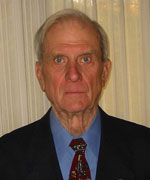 Lillian M. Gilbreth Distinguished Professor Emeritus
Lillian M. Gilbreth Distinguished Professor Emeritus
Purdue University
School Of Industrial Engineering
1287 Grissom Hall
West Lafayette, IN 47907-1287
Phone: 765-494-0828
E-mail: dcompton@purdue.edu
- Health Care Delivery - Can Engineering Help? (G,S,P)
Adela I. de la Torre
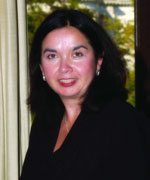 Professor and Director Chicana and Chicano Studies Program
Professor and Director Chicana and Chicano Studies Program
University of California, Davis
Chicana/o Studies Program
Hart Hall
One Shields Avenue
Phone: 530-752-2421
E-mail: adela@ucdavis.edu
Dr. de la Torre received her Ph.D. in Agricultural and Resource Economics in 1982 from the University of California, Berkeley. Her research interests include: border/immigration policies, health-care access/finance issues, Latina/o health, risk and cultural factors associated with HIV/AIDS transmission. From 1996-2002, she was director of the Mexican American Studies and Research Center at the University of Arizona. Prior to that appointment, Dr. de la Torre chaired the Chicano and Latino Studies Department at Long Beach from 1991-1995. She also served as a syndicated columnist in the Los Angeles Times. She was past President of the American Society of Hispanic Economists. She is a member of the National Hispanic Science Network on Drug Abuse and Chair of the board of the Latino Coalition for a Healthy California, Her books include: Mexican Americans and Health: Sana! Sana! (2001) and Moving from the Margins: A Chicana Voice on Public Policy (2004).
American Meteorological Society -
Sigma Xi Lecturer
Kerry Emanuel
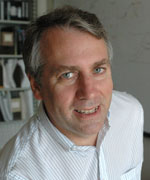 Professor
Professor
Massachusetts Institute of Technology
Room 54-1622
77 Massachusetts Avenue
Cambridge, MA 02139
Phone: 617-253-2462
E-mail: emanuel@texmex.mit.edu
Dr. Kerry Emanuel is a professor of atmospheric science at the Massachusetts Institute of Technology, where he has been on the faculty since 1981, after spending three years as a faculty member at UCLA. Professor Emanuel's research interests focus on tropical meteorology and climate, with a specialty in hurricane physics. His interests also include cumulus convection, and advanced methods of sampling the atmosphere in aid of numerical weather prediction. He is the author or co-author of over 100 peer-reviewed scientific papers, and two books, including Divine Wind: The History and Science of Hurricanes, recently released by Oxford University Press and aimed at a general audience. It received the 2007 Louis Battan Author's Award from the American Meteorological Society.
Society for Risk Analysis - Sigma Xi Lecturer
Adam M. Finkel
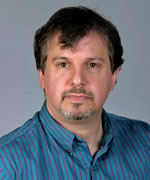 Professor, Department of Environmental and Occupational Health
Professor, Department of Environmental and Occupational Health
University of Medicine and Dentistry of New Jersey
402 Robertson Hall, WWS
Princeton University
Princeton, NJ 08544
Phone: 609-258-4828
E-mail: afinkel@princeton.edu
Dr. Adam M. Finkel is Professor of Environmental and Occupational Health at the University of Medicine and Dentistry of New Jersey (UMDNJ) School of Public Health, and Visiting Professor at Princeton University's Woodrow Wilson School of Public and International Affairs. He has 20 years experience in both government and academia analyzing risks to human health and implementing creative solutions to reduce them. Dr. Finkel has an unusually broad academic background, with a doctoral degree in environmental health sciences and a master's degree in public policy, both from Harvard University, and has written many articles in the medical, legal, economics, and statistical literature. For ten years (1995-2005) he was a senior executive at the U.S. Occupational Safety and Health Administration (OSHA), serving as OSHA's national director of regulatory programs in Washington, D.C., and later as chief OSHA administrator in the six-state Rocky Mountain region, based in Denver, CO. He has pioneered methods to quantify and communicate the uncertainties in risk and cost estimation, and to explore the variation in environmental and medical risks individual citizens and patients face due to differences in susceptibility, exposure, and other factors.
Dr. Finkel's research has shown that traditional methods of risk assessment and cost-benefit analysis often underestimate risks and overestimate the economic costs of sensible interventions to reduce them, contrary to the "conventional wisdom" about these issues. He maintains, however, that when performed in a thoughtful and humane manner, risk assessment can point the way to more protective policies than can a "precautionary principle" that sidesteps analysis altogether. He has put these views into effect as designer of OSHA's most sophisticated health regulations, as well as the Agency's first "enforceable partnerships" that brought government, industry, and labor together to craft protections beyond what traditional regulation could offer. He has returned to academia after successfully forcing OSHA to establish a testing program to evaluate the problem of chronic beryllium disease among its own workers, and thus can speak to the clash of scientific integrity with contemporary politics.
Barbara Gerbert
Professor and Chair
University of California San Francisco
Suite 905
350 Parnassus Avenue
San Francisco, CA 94117
Phone: 415-502-7283
E-mail: Barbara.gerbert@ucsf.edu
Web: http://www.ucsf.edu/chips/
- When Asked, Patients Tell: Disclosure of Sensitive Health-Risk Behaviors (S)
- Role of Health Care Professionals in Helping Victims of Domestic Violence (G,S)
- Bet You and Your Doctor Don't Talk about Sex: A Conversation Starter for Patients (G)
Barbara Gerbert, PhD is Professor and Chair of the Division of Behavioral Sciences, Professionalism, and Ethics, and the Director of the Center for Health Improvement and Prevention Studies at the University of California San Francisco. She is committed to understanding the barriers to optimal health care and to improving the quality of health care. Specifically, her goals are to: 1) identify behavioral risks and patient, provider, and systemic barriers to optimal health care delivery; 2) design and test innovative interventions to support and simplify the providers' role in prevention; 3) develop new methods of providing optimal health risk assessment and prevention counseling through multimedia; and 4) disseminate her research findings to relevant policymakers and the public. Since 1980, Dr. Gerbert has received funding from six different NIH Institutes for investigations covering a range of prevention topics, including tobacco use, substance abuse, HIV/AIDS, skin cancer, and domestic violence.
John R. Gersh
Principal Professional Staff
The Johns Hopkins University
Applied Physics Laboratory
11100 Johns Hopkins Road
Laurel, MD 20723
Phone: 443-778-5503
Fax: 443-778-6904
E-mail: john.gersh@jhuapl.edu
John Gersh is a member of the Principal Professional Staff of The Johns Hopkins University Applied Physics Laboratory. His interests involve investigating the interactive depiction of an information-rich environment to decision makers and developing knowledge representations and software architectures to enable those interactions. He has also worked extensively in the area of human interaction with complex automation and autonomous systems. During his twenty-five years at JHU/APL he has participated in system development and led research teams in these areas in domains as diverse as airport operations, Navy shipboard systems, spacecraft autonomy, and intelligence analysis. He was instrumental in the development of an R&D program in cognitive engineering at JHU/APL. Mr. Gersh received S.B., S.M., and E. E. degrees in electrical engineering from M.I.T., and also studied philosophy at Harvard, which has turned out to be surprisingly useful in thinking about people interacting with information and with the world.
Diane Gifford-Gonzalez
Professor, Anthropology
Social Sciences 1 Faculty Svcs
University of California - Santa Cruz
Santa Cruz, CA 95064
Phone: 831-459-2633 Fax: 831-459-5900 E-mail: dianegg@ucsc.edu
Diane Gifford-Gonzalez specializes in zooarchaeology, having done fieldwork in Kenya, Tanzania, Netherlands, and the western U.S. Current research includes NSF-funded work on animal and human paleoecology around Monterey Bay, ethnicity and animal use at a colonial New Mexican Pueblo, and early pastoralism in Niger and Kenya. She has taught graduate seminars at the Universities of Nairobi and Tromsø, and the Chinese Academy of Science, authored over 50 academic articles and book chapters.and received two distinguished teaching awards. She has served on editorial boards of major Africanist journals and governing boards of the Society of Africanist Archaeologists, the International Conference of Archaeozoology, Society for American Archaeology, and the Archaeology Division of the American Anthropological Association, and on the Academic Advisory Council of the Wenner-Gren Foundation for Anthropological Research. She is Curator of the Monterey Bay Archaeology Archives and serves on the board of the Cabrillo College Archaeological Technology Certificate Program.
Manjit S. Kang
Office of Vice Chancellor
Thapar Hall
Punjab Agricultural University
Ludhiana 141 004
India E-mail: manjit5264@yahoo.com
Web: http://www.geocities.com/drmanjit_kang/
Manjit S. Kang, Vice Chancellor of Punjab Agricultural University in India, received his Ph.D. degree in 1977 from University of Missouri-Columbia. He has edited/authored 10 books, including Genotype-by-Environment Interaction, Quantitative Genetics, Genomics and Plant Breeding, Crop Improvement, Handbook of Formulas for Breeders and Geneticists, GGE Biplot Analysis, and Genetic and Production Innovations in Field Crop Technology. He has lectured on quantitative genetics as applied to crop improvement in Hungary under the USDA/OICD sponsorship. In 1999, he won a 3-month Fulbright Senior Scholar (Lecturing Award) to Malaysia. He was the recipient of the 2005 South Dakota Crop Improvement Association Lectureship. He has conducted workshops/seminars at International Rice Research Institute in the Philippines and International Institute of Tropical Agriculture in Nigeria. He is Fellow of American Society of Agronomy and Crop Science Society of America. He serves as Technical Editor of Crop Science, Senior Editor of Journal of Crop Improvement, and Editor-in-Chief of Communications in Biometry and Crop Science.
Dr. Kang has organized successful international symposia on genotype-by-environment interaction in plant breeding, quantitative genetics, and agricultural and environmental sustainability. He has published more than 100 refereed journal articles and many book chapters and essays in encyclopedias of genetics and crop science. He has been active in Sigma Xi since 1975 and served as President of the LSU Chapter of Sigma Xi twice (2000-2001 and 2005-2006). He was recognized for his significant contributions to plant breeding and genetics by Punjab Agricultural University in Ludhiana at its 36th Foundation Day in 1997. Dr. Kang's biographical sketches have appeared in Marquis Who's Who.
Todd R. Klaenhammer
Distinguished University Professor and William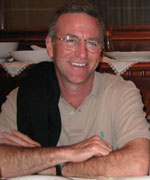 Neal Reynolds Professor
Neal Reynolds Professor
Department of Food Science
Box 7624
North Carolina State University
Raleigh, NC 27695
Phone: 919 515 2972
Fax: 919-513-0014
E-mail: klaenhammer@ncsu.edu
Todd R. Klaenhammer obtained degrees in Microbiology (B.S), and Food Science (M.S. & Ph.D) from the University of Minnesota. In 1978, he joined North Carolina State University and currently holds faculty appointments in the Departments of Food Science, Microbiology, and Genetics and serves on the Biotechnology and Genomics training programs. For 27 years he has directed a research program on food bioprocessing and the genetics of lactic acid bacteria and their bacteriophages. His group has published nearly 200 articles in journals and books, and filed a number of patents in bacterial genomics and on mechanisms by which bacteria resist viruses Todd is Fellow in the American Academy of Microbiology, the Institute of Food Technologist, and the American Dairy Science Association. In 2001, he was elected into the National Academy of Sciences and currently serves on their Committee for Scientific Programs and co-chairs the German-American Frontiers of Science Program.
Bruce A. Macher
Professor of Chemistry and Biochemistry
San Francisco State University
Department of Chemistry and Biochemistry
San Francisco, CA 94132
Phone: 415-338-6078
E-mail: macher@sfsu.edu
Bruce Macher is a professor of biochemistry at San Francisco State University, where he has been since 1987. Prior to his faculty position at San Francisco State University, he was a faculty member in the Cancer Research Institute at the University of California, San Francisco. He research has focused on glycoconjugate biochemistry and the application of mass spectrometry to biochemical research problems. Currently, his research is focused on the development of methodology for proteomic analysis. He has developed a range of programs aimed at improving biomedical research infrastructure at San Francisco State University, and in collaboration with colleagues at the University of California at Davis and San Francisco, he has developed programs designed to provide postdoctoral scholars with the knowledge, skills and experience to succeed in faculty positions.
Gary S. May
Professor and Steve W. Chaddick School Chair
Georgia Institute of Technology
School of Electrical and Computer Engineering
777 Atlantic Drive NW
Atlanta, GA 30332-0250
Phone: 404-894-2901
Fax: 404-894-4641
E-mail: gary.may@ece.gatech.edu
Dr. Gary S. May is the Steve W. Chaddick School Chair of the School of Electrical and Computer Engineering at the Georgia Institute of Technology. In this role, he is the chief academic officer of the school, providing leadership to over 100 faculty members and 1,500 students.
Dr. May's field of research is computer-aided manufacturing of integrated circuits. He has authored over 200 technical publications and contributed to 14 books on that topic. He has also participated in the acquisition of over $49 million in research funding, and he has graduated 13 Ph.D. students. In 1993, Dr. May was named Georgia Tech's Outstanding Young Alumnus, and in 1999, he received Georgia Tech's Outstanding Service Award. Dr. May has won two Best Paper Awards from IEEE Transactions on Semiconductor Manufacturing (1998 and 2000). In 2000, Dr. May was selected by the National Academy of Engineering to participate in Frontiers of Engineering Conference as one of "the nation's top 100 engineers between the ages of 30-45." In 2004, Dr. May received Georgia Tech's Outstanding Undergraduate Research Mentor Award, as well as the Outstanding Minority Engineer Award from the American Society of Engineering Education.
Dr. May created the Summer Undergraduate Research in Engineering/Science (SURE) program, for which he has been granted $1.9M from the National Science Foundation (NSF). Through SURE, he annually hosts minority students to perform research at Georgia Tech in the hopes that they will pursue a graduate degree. Nearly 90% of SURE participants enroll in graduate school. Dr. May is the also creator/director of the Facilitating Academic Careers in Engineering and Science (FACES) program, for which he has been granted over $10M from NSF to double the number of African American Ph.D. recipients produced by Georgia Tech. Over the duration of FACES, 138 minority students have received Ph.D. degrees in science or engineering at Georgia Tech - the most in such fields in the nation. Dr. May is a member of the National Advisory Board of the National Society of Black Engineers. Dr. May received his B.S. in electrical engineering from Georgia Tech in 1985 and the M.S. and Ph.D. degrees in electrical engineering and computer science from the University of California at Berkeley in 1988 and 1991, respectively.
Jon McCammond
Associate Professor of Mathematics
Department of Mathematics
University of California Santa Barbara
Santa Barbara, CA 93106
Phone: 805-893-2060
E-mail: jon.mccammond@math.ucsb.edu
Jon McCammond is currently an associate professor of mathematics at the University of California, Santa Barbara. He received his Ph.D. in Mathematics from the University of California Berkeley in 1991 and bachelor's degrees in Mathematics, Physics and German in 1988 from Bethel College in Kansas. Before arriving in Santa Barbara in 2002, he was an assistant professor at Texas A&M University and a community college instructor at Chabot College in Hayward, California. His recent research has ranged in area from geometric group theory to low-dimensional topology to geometric combinatorics. A constant theme underlying this wide range of areas has been the constructive aspects of various geometrically defined constructions. When he is not researching mathematics through the use of colorful pictures and hand-held manipulative devices (i.e. toys), he enjoys reading, cooking, ocean kayaking and watching lots of films.
Philip A. Meyers
Professor of Geological Sciences
The University of Michigan
CC Little Bldg Geological Sciences
1100 North University Avenue
Ann Arbor, MI 48109-1005
Phone: 734-764-0597
E-mail: pameyers@umich.edu
Philip A. Meyers is an organic geochemist who is interested in the processes that are involved in the origin, delivery, and accumulation of organic matter in sediments and the evidence for paleoenvironmental changes that are recorded in the composition of sedimentary organic matter. His research focuses on paleoenvironmental reconstructions based on organic matter in Cretaceous black shales, Mediterranean sapropels, and Holocene lake sediments. The unifying element of his studies of marine and lake records is that both types of systems are sensitive to global climate change, although in ways that are differently influenced by local or regional factors. The marine records generally yield information about large-scale processes, whereas the lake records respond more rapidly to shorter-term phenomena. These various processes impact the production, delivery, and preservation of organic matter in the bottom sediments, which provides information that can be interpreted to yield histories of paleoenvironmental changes.
Use of multiple geochemical and sedimentary proxies is a distinctive feature of his approach to reconstructing paleoenvironmental histories. From his early research using bulk organic matter properties and lipid biomarkers, he has added organic carbon and nitrogen stable isotope compositions, Rock-Eval pyrolysis, and redox-sensitive trace metals to the suite of proxies he routinely uses. Active collaboration with other organic geochemists has broadened the range of organic geochemical proxies he finds useful to include hydrogen isotope values and compound-specific carbon isotope analyses for specific projects. He also works closely with marine micropaleontologists to integrate microfossil and organic geochemical evidence of paleoenvironmental conditions. An interesting aspect of his paleoreconstruction research is that his findings have relevance to estimating the future consequences of modern processes, such as human activities and climate change.
Naomi Miller
Senior Research Scientist
University of Pennsylvania
Museum Applied Science Center for Archaeology (MASCA)
3260 South Street
Philadelphia, PA 19104
Phone: 219-898-4058
E-mail: nmiller0@sas.upenn.edu
Naomi F. Miller is an archaeologist specializing in the study of plant remains from archaeological sites. She has conducted most of her field work in west and central Asia: Turkey, Iran, Syria, and Turkmenistan, but has also done stints in New Jersey, Tunisia, and elsewhere. Her main research interests are the long-term impact of human societies on the landscape and ancient economy and land use. Her current work at Gordion increasingly involves figuring out how to use living plants to help preserve the ancient ruins, improve pasture land, and incorporate environmental education into the presentation of the site and its museum. She has served as editor of the Journal of Ethnobiology and is on the editorial board of Paléorient and Expedition magazine. She has co-edited several scholarly books and produced an archaeological memoir illustrated with watercolors painted in the field (Drawing on the Past, an Archaeologist's Sketchbook)
Albert J. Paul
Physicist
National Institute of Standards and Technology
101 Bureau Drive, Bldg: 223, Mailstop: 8522
Gaithersburg, MD 20899
3019756004 (voice)
Fax: 301-975-3445
E-mail: albert.paul@nist.gov
Albert Paul is a physicist in the Electronic and Optoelectronic Materials Group within the Ceramic Division. He has been a member of the research staff in the Material Science and Engineering Lab at N.I.S.T. since 1990. Albert received a B.A. in physics from the University of the District of Columbia in 1980 and a Ph.D. in applied physics from Howard University in 1988. While in graduate school and at the University of California at Davis, Department of Chemistry; his research focused on studying the dynamics in the dissociation of small molecules. He used polarized lasers to dissociate parent gas molecules and Polarized Laser Induced Fluorescence(PLIF) techniques to probe the internal and external energy states of the fragments formed before . This work included the use of second and third harmonic ultraviolet light generation with doubling crystals and in inert gases, to generate higher dissociation energies.
While at N.I.S.T., Albert has done research on a number of projects relating to the characterization of wide-bandgap materials. He began by measuring the distribution of species produced in the laser evaporation of ceramic targets(that produce thin films), by using mass spectrometry and has modeled the laser-evaporation process with finite-element and Monte Carlo simulations.
Albert is a member of a N.I.S.T. research team that is charged with developing the first composition standards for an Aluminum Gallium Arsenide compound semiconductors. He uses photoluminescence spectroscopy(PLD) to measure direct and indirect emission energies as a function of Al composition. In another project, he used microRaman and PLD to measure the shift in vibrational and emission energies, respectively, with changes in Al composition and a calibrated applied stress. In still another project, He used microRaman spectroscopy to study the local residual stress in thermally cycled Yttrium stabilized Zirconia thermal barrier coatings. He also used PLD to study the formation and changes in an aluminum oxide layer formed at the interface between the thermal coating and a metallic bond coat with increased cycling.
Albert is currently working on developing` a prototype of a strain standard for strained silicon that will be used to calibrate equipment used insitu during the manufacturing process. He is using ultraviolet Raman spectroscopy to measure the Raman shift in vibrational spectra as a function of the strain in ultra thin strain silicon films.
National Cancer Institute -
Sigma Xi Lecturer
Vito Quaranta
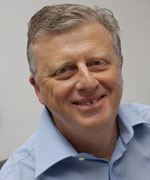 Professor of Cancer Biology
Professor of Cancer Biology
Co-Director, Center for Matrix Biology
Vanderbilt University School of Medicine
446B PRB, 2220 Pierce Avenue
Nashville, TN 37232
Phone: 615-936-2868
Fax: 615-936-1190
E-mail: vito.quaranta@vanderbilt.edu
Dr. Vito Quaranta, MD, is a Professor of Cancer Biology at Vanderbilt University School of Medicine, Nashville, TN, since May 2003. He is Director of the Vanderbilt Integrative Cancer Biology Center, and Co-Director of the Center for Matrix Biology at Vanderbilt. Dr. Quaranta obtained a Medical Degree and a Hematology Board from the University of Bari School of Medicine, Bari, Italy. He passed the Board examination of the United States Educational Commission for Foreign Medical Graduates and moved to La Jolla, California, in 1977. He received post-doctoral training and later held academic positions, including tenure, at the Department of Cell Biology of The Scripps Research Institute, La Jolla, CA for twenty-five years. He achieved honors from the Leukemia Society of America, the American Cancer Society and the Italian-American Medical Education Foundation.
His fields of interest have been oncology and matrix biology for over twenty years. His favorite research topic is cancer invasion and metastasis. He authored several relevant chapters in numerous medical books and over a hundred scientific articles in the field of cancer biology. He has been and invited lecturer in numerous international congresses and distinguished conferences on cancer biology, including the American Association for Cancer Research, the Swiss Institute for Experimental Cancer Research, the American Red Cross, the National Cancer Institute, the Metastasis Research Society, the Keystone Symposia on Molecular and Cancer Biology. For over 15 years he held advisory positions in scientific institutions including Special Emphasis review member at the National Cancer Institute and ad hoc member of several Study Sections at the National Institute of Health. He is associate editor of two well recognized scientific journals (Journal of Cellular Physiology and Cancer Research) and regularly reviews for prestigious professional journals.
Recently, Dr. Quaranta has focused on systems biology approaches to cancer invasion. With substantial funding from the National Cancer Institute, he has started and directs the Vanderbilt Integrative Cancer Biology Center, where he is implementing a cutting-edge interdisciplinary effort melding mathematics, engineering, computation and biology, in order to solve the problem of cancer invasion and metastasis.
Sue V. Rosser
Dean and Professor
Ivan Allen College of Liberal Arts, Dean's Office
Georgia Institute of Technology
781 Marietta Street
Atlanta, GA 30332
Phone: 404-894-1728
Fax: 404-894-8573
E-mail: sue.rosser@iac.gatech.edu
Sue Rosser received her PhD in Zoology from the University of Wisconsin--Madison in 1973. Since July 1999, she has served as Dean of the Ivan Allen College of Liberal Arts at Georgia Tech, where she is also Professor of History, Technology, and Society. From 1995-1999, she was Director for the Center for Women's Studies and Gender Research and Professor of Anthropology at the University of Florida--Gainesville. In 1995, she served as Senior Program Officer for Women's Programs at NSF. From 1986 to 1995, she was Director of Women's Studies at the University of South Carolina, where she was also a Professor of Famly and Preventive Medicine in the Medical School. She has edited collections and written appproximately 115 journal articles on the theoretical and applied problems of women, science, technology and women's health. She has authored 9 books, including Re-engineering Female-Friendly Science (1997, Teacher's College Press), Women, Science, and Society: The Crucial Union (2000, Teacher's College Press, and most recently, The Science Glass Ceiling: Academic Women Scientists and the Struggle to Succeed (2004, Routledge). She currerntly serves as co-PI on Georgia Tech's $3.7 million ADVANCE NSF grant and has held several other grants from NSF. During the fall of 1993, she was Visiting Distinguished Professor for the University of Wisconsin System Women in Science Project.
Veronica Vaida
Professor
University of Colorado, Boulder
Department of Chemistry and Biochemistry
Boulder, CO 80309-0215
Phone: 303-492-8605
E-mail: vaida@colorado.edu
Dr. Veronica Vaida is a Professor of Chemistry and Biochemistry and a Fellow of the Cooperative Institute for Research in Environmental Sciences at the University of Colorado. She obtained her undergraduate degree at Brown University, a Ph.D. in 1977 from Yale University, New Haven, CT and was an Assistant and Associate Professor of Chemistry at Harvard University before coming to Colorado in 1984. Her current research at the interface of physical chemistry and atmospheric science involves the study of spectroscopy and photoreactivity of atmospheric radicals, their complexes and aerosols.
Roger White
University Research Professor
Memorial University of Newfoundland
Department of Geography
St John's, NF A1B 3X9
Canada
Phone: 709-737-7417
E-mail: roger@mun.ca
Web: http://www.mun.ca/geog/people/faculty/rwhite.php
Roger White is University Research Professor in the Department of Geography, Memorial University of Newfoundland, St. John's, Canada, and since 1990 has also been Visiting Professor and Senior Scientist with the Research Institute for Knowledge Systems in Maastricht, The Netherlands. He received his PhD in geography from the University of North Carolina Chapel Hill in 1972, and taught at the University of Western Ontario before moving to Memorial in 1977. He has been visiting professor at several universities in Europe and North America, and has worked as a consultant at Los Alamos National Laboratory and as an invited researcher at the Santa Fe Institute. He has lectured widely in North and South America, Europe, and Australia. His research involves the use of algorithmic techniques like difference equations, cellular automata and agent based modeling to understand the structure, functioning, and evolution of geographical systems. Initially the focus was on cities and urban centered regions, and produced models with immediate relevance to problems such as traffic flow and urban sprawl. However, more recently the emphasis has shifted to integrated models of human-natural systems in which the geographical model provides a platform for linking other models of human systems, such as economic and demographic models, to models of natural systems in order to understand the functioning of the entire system as an integrated dynamic whole. This work underlies a developing theory of cities and regions as self-organizing, complex adaptive systems. It is also the basis of new software being developed to aid integrated planning of cities and regions, with trials currently underway in several countries. The work is also driving innovations in validation techniques for theories of complex, far-from-equilibrium systems.
Alison P. Williams
Lecturer, Department of Chemistry
Frick Labs
Princeton University
Washington and William Street
Princeton, NJ 08544
Phone: 609-258-6289
Fax: 609-258-6746
E-mail: alisonw@princeton.edu
- Ion Effects on the Physical Behavior of DNA (G,S)
- Time Resolved UV Resonance Raman Studies of Nucleic Acids (G,S)
- Lessons from the Lab: An African-American Woman's Journey from Manure to DNA (P,G)
- Who Will Do Science in the 21st Century? (P,G)
Alison Williams began her scientific career in high school working at the Ohio State Agricultural Research and Development Center in Wooster, Ohio. She received her undergraduate degree in chemistry from Wesleyan University and her M.S. and Ph.D. in biophysical chemistry from the University of Rochester where she was a NSF graduate fellow. She taught at Swarthmore College and Wesleyan University before joining the faculty of the chemistry department at Princeton University in 2003. Her research focuses on thermodynamic and kinetic properties of nucleic acids. Most recently her work emphasizes the role of ions in shaping the physical properties of oligonucleotides. She currently is an NSF ADVANCE Fellow. Dr. Williams has also received numerous recognitions for her teaching, outreach and mentoring activities for scientists of all ages.
Michael Wolf
Professor of Mathematics and Chair
Rice University
Department of Mathematics MS-136
Houston, TX 77005
Phone: 713-348-6293
E-mail: mwolf@math.rice.edu
Michael Wolf received his B.S. in Mathematics and Philosophy from Yale in 1981 before earning his Ph.D. at Stanford in 1986. After a term as a Moore Instructor of Mathematics at M.I.T., he moved in 1988 to Rice University where he is now Professor and Chair of the Mathematics Department. His research is in the geometry of surfaces, especially surfaces which are optimal in some way. In particular, one of his interests is the classical subject of minimal surfaces - mathematical versions of soap films -- which despite theory and examples stretching back through the centuries to Euler, is an active field of contemporary mathematics. In this area, Wolf and his co-authors have found several new examples with some surprising properties while ruling out other types of films. He was a Sloan Research Fellow in 1991-3, and is presently on the editorial boards of the Journal of Geometric Analysis and the Bulletin of the American Mathematical Society.
James Wyche
Vice Provost for Academic Affairs
Professor Biochemistry & Molecular Biology
University of Oklahoma Health Sciences Center
Robert M. Bird Library, Room 164
Oklahoma City, OK 73117
Phone: 405-271-2390
E-mail: James-Wyche@ouhsc.edu
Web: http://w3.ouhsc.edu/BIOCHEM/wyche.htm
- Uses of Natural Products and Their Analogues in Drug Discovery (G, S)
- Student and Faculty Research at International Training Sites (G)
- Pleasures of Being a Professor and Barriers Yet to Overcome (P,G)